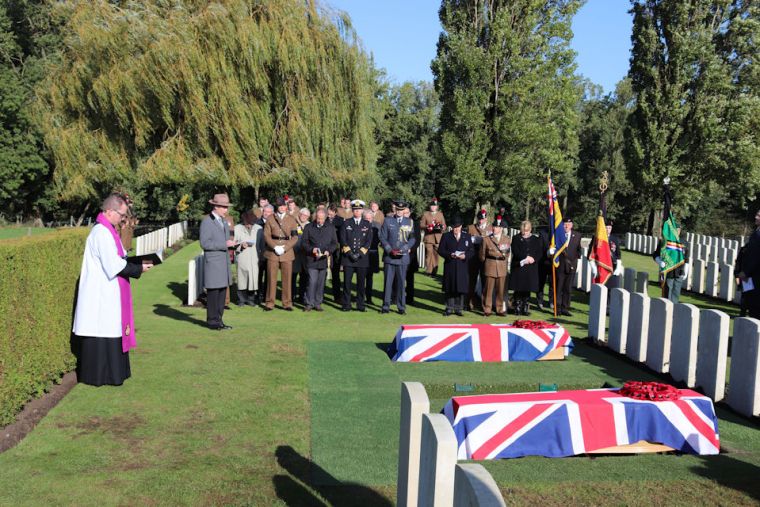Army chaplain praises 'great sacrifice' of 13 previously missing WWI soldiers finally laid to rest

An army chaplain has paid tribute to the "great sacrifice" shown by previously missing soldiers from World War I who were finally laid to rest on Thursday.
The burial of the 13 soldiers brings closure to the crowdfunded Dig Hill 80 archaeological project in Wytschaete, near Ypres, Belgium, that discovered a total of 110 previously missing soldiers.
The archaeological project began last year, with 550 metres of trenches and 430 bomb craters being excavated. The aim was not only to excavate the trenches but also to recover the soldiers.
The 13 buried on Thursday came from Commonwealth nations, including the UK, and were buried side by side at a ceremony at the Commonwealth War Graves Commission's Wytschaete Military Cemetery.
Due to the heavy nature of the fighting in the area during the First World War, it was not possible for the individuals to be formally identified, but the Ministry of Defence said that at least two were believed to be British, with one of them found wearing dentures manufactured in the UK.
Members of the 1st Battalion The Royal Regiment of Fusiliers helped to lay the men to rest and performed the gun salute.
The regiment's chaplain, Father O'Driscoll, said: "We come together today to remember and thank these men for their great sacrifice in fighting and dying together as one.
"Even though we do not know their names, we remember their humanity and courage and that even in the hell of battle they were there for each other even to death.
"So in prayer and celebration we place these men together in this consecrated and special ground, so that they rest in peace and we learn and make sure humanity endures in its fullness."
The funeral service was organised by the Ministry of Defence's Joint Casualty and Compassionate Centre (JCCC).
Rosie Barron, from the JCCC, said it had been a "privilege" to organise the funeral.
"Although these men were not identifiable, their sacrifice will not be forgotten. They have now been given the burial service they deserve and will rest alongside their comrades in perpetuity," she said.
The archaeological dig spanned the former site of Hill 80 in Wytschaete and was carried out before construction commences on a new housing development.
Before the First World War, it was the site of a windmill but it was captured by the Germans in 1914 and became an entrenched gun position where they enjoyed observational advantage overlooking the town of Ypres.
It was captured by the Allies in the Battle of Messines in June 1917 before being taken again by the Germans during the Battle of Lys the following year. By September 1918, it was recaptured for the last time by the Allied forces.
Dig Hill 80 Head Archaeologist Simon Verdegem said he hoped the burial of the men would be a "symbol of peace and reconciliation".
"Now, the British and German soldiers will finally be given a definitive and dignified resting place along with their comrades," he said.
"I dare to believe that it gives them peace, knowing that people from all over the world have joined forces to recover their mortal remains. In my opinion, this can count as a symbol of peace and reconciliation."
The German soldiers discovered on Hill 80 were to be laid to rest in a separate ceremony at the German war cemetery in Langemark on Friday.











